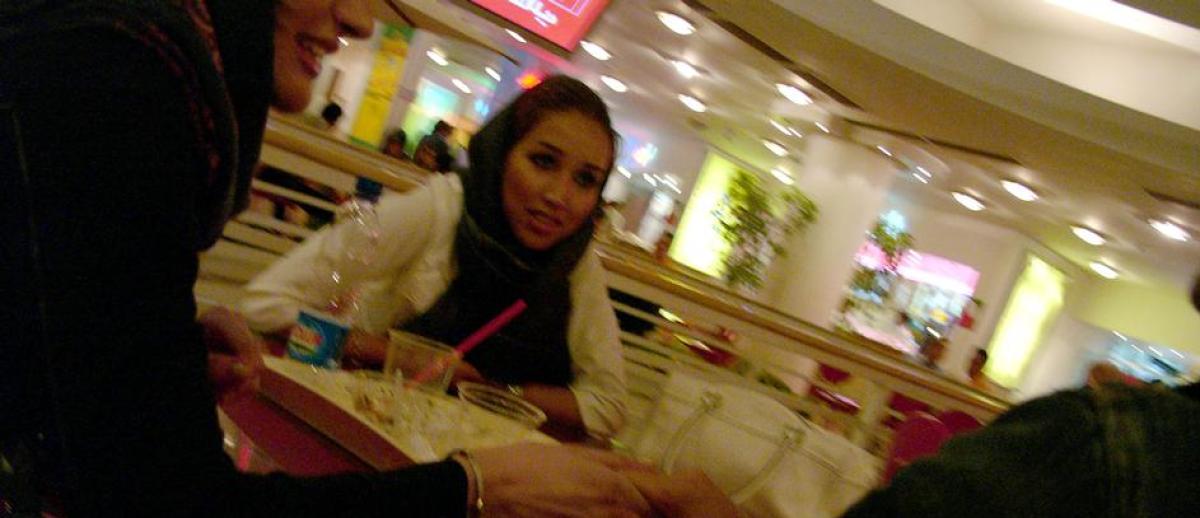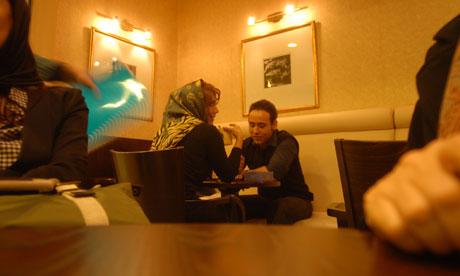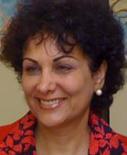Contradictions of Muslim Romance in the Facebook World
archive


Contradictions of Muslim Romance in the Facebook World
Romantic love has become a social fact in the Muslim world. Young people increasingly want love in their married lives, but they and the communities in which they live remain uncomfortable with the mating practices through which such love has been achieved in the West. We explore these contradictions and the religious and gender politics of modern heterosexual love in seven Muslim- majority countries: Algeria, Iran, Egypt, Pakistan, Palestine, Tunisia, and Turkey, where we conducted Web-based anonymous surveys of Facebook users. Our analysis employed statistical techniques to estimate a model of variation in intimate attitudes and behaviors among nearly 18,000 respondents who completed the survey.
Facebook, which is very popular in the countries we surveyed, provided us access to the private musings of young people who live in societies where public discourse often obscures their aspirations and desires. The course of political and legislative struggles, the pronouncements and fatwas, even the changing moral teachings of the communities to which young people belong, do not tell us how individual young Muslims in these countries mediate between love, physical intimacy, and religion in their own lives. How does engagement with Islam by young women or young men shape the way they organize their intimate lives?
Based on our survey, we empirically examined the intimate behaviors of young Muslims in each of our Muslim-majority nations. The analysis of the data proceeded in four steps. We assessed, first, the extent to which people in these countries make love a criterion of mate choice; second, the several determinants of who makes love a criterion of mate choice; third, the extent to which those who make love a criterion for mate choice approve of new courtship practices that accompany romantic love and the determinants of that approval; and fourth, whether and why they actually engage in these courtship practices.

What we observe is that, while many young people want to marry for love, they morally reject the practices necessary to accomplish it—a rejection that reduces their willingness to engage in those practices. Adherence to religious beliefs and norms of every sort is associated with the moral condemnation of such practices. Yet many pious Muslims not only seek love, but they also dare to participate in courtship practices that are haram, forbidden. Those who seek love as a basis of mate choice are more likely to approve of such transgressions, and they are also more likely to engage in them.
Love seekers are much more likely to court illicitly, while controlling for their religious engagement and their moral sense that such behaviors are wrong. Love seeking promotes forbidden intimate contact—being alone, holding hands, and kissing—as much as Islamist commitments reduce them. The effect of love seeking is greater than any other non-locational variable. The strength of the net effect, of its behavioral entailments, gives us some confidence that the term “‘‘love”’’ is a meaningful one for this sample.
Pious Muslims are both repudiating Western patterns of premarital physical contact and seeking to push the boundaries of acceptable contact through new patterns of chaste heterosexual socialization, and, of course, through contacts via social media of various kinds, from Facebook Messenger to Snapchat. They are creating new kinds of places, such as religious cafes in Istanbul, where single women and men consider being together even during Ramadan a legitimate or hallal form of social interaction. Similarly, large shopping malls in the Emirates are gathering spots for groups of young men and young women who sit separately at cafés while glancing at each other and chatting via cell phone. They are also utilizing defunct premodern practices, such as the very old tradition of engaging in sex after the signing of the marriage contract and before the wedding ceremony takes place, but taking it a step further. In Iran, for example, rural couples, who have signed the contract, might go away to another city and openly stay in a hotel together. Some today consider this an acceptable way of assessing their romantic affinities before publicly celebrating their wedding (Hegland 2013).
What we observe is that, while many young people want to marry for love, they morally reject the practices necessary to accomplish it—a rejection that reduces their willingness to engage in those practices.
Love is a form of gender politics. As we note in our analyses, married women are less likely than men to have married for love. Yet single women are no less likely to want to marry for love, and are more likely than single men to approve of being alone and kissing, new practices associated with courtship. And women are just as likely as men to engage in these practices. The data is consistent with the hypothesis that young women may want to experience the pleasures of romantic courtship, of passion, but realize that love cannot be a criterion for mate selection because of the risks entailed. The data also aligns with ethnographic work that suggests that for young, single Muslim women, feeling and acting upon sensuous desires is a major form through which they express a rejection of the selflessness that they saw in their mothers (Ozyegin, 2015: 143). There are undoubtedly many different manifestations of these desires. But the results of our survey suggest that in the countries we studied, young Muslim women, who are often subject to masculine control, are leading the way in the liberalization of intimate life.

The ordering of intimacy is at the center of the political-theological struggles that have been shaking the Muslim world for half a century. The rise of romantic love may indeed empower women and eventually lead to the erosion of support for the dominant forms of political Islam. But there are numerous obstacles in the way. The Middle East and North Africa (MENA) continue to have the lowest employment-to-population ratio for women.
Whereas around 50% of women in developing countries are either employed or actively looking for jobs, in MENA the figure is 25%. If a single woman cannot earn a living, she must depend on the income of a prospective spouse. Under these conditions, it is difficult to make love a necessary condition for marriage. Without the ability to secure employment, a divorced woman’s options are limited: to return to her family of origin, where she assumes a shadowy existence, or to seek a customary marriage that lacks the legal rights and respect associated with a formal marriage, reducing the woman to the status of a concubine. Indeed, such customary marriages are frequently the only option for divorced women with limited prospects of employment.
We believe that romantic love can be a critical resource for democratization, leading to greater recognition of individual rights for women and men in Muslim societies and holding the potential to alter existing gender, social, ethnic, and religious hierarchies. Nevertheless, it is clear that marriage reforms need to be combined with policies that address related economic, social, and legal issues confronting women in societies of the Middle East and North Africa.
About the co-authors: Paolo Gardinali is the Associate Director of the UCSB Social Science Survey Center. Cambria Naslund studies sociology and psychology at New York University Abu Dhabi.
This essay is excerpted from the authors’ forthcoming article, "Love in the Middle East: The Contradictions of Romance in the Facebook World,” Critical Research on Religion 4: 3 (Fall 2016): 229-258.
El-Feki, S. (2013) Sex and the Citadel: intimate life in a changing Arab world.
Eltahawy, M. (2015) Headscarves and hymens: why the middle east needs a
Hegland, M. (2013) Days of Revolution: Political Unrest in an Iranian Village.
Ozyegin, G. (2009) “Virginal Facades: Sexual Freedom and Guilt Among Young
White, J.B. (2013) Muslim nationalism and the new Turks. Princeton:




